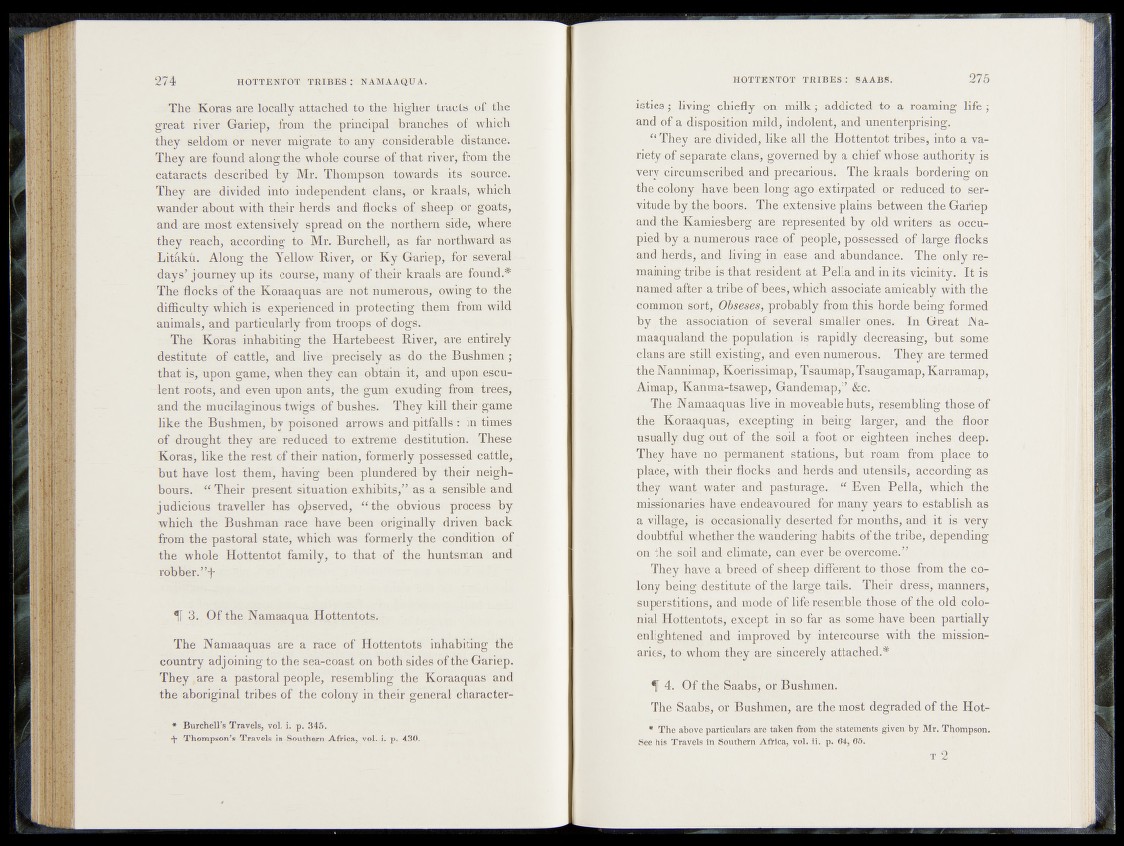
The Koras are locally attached to the higher tracts of the
great river Gariep, from the principal branches of which
they seldom or never migrate to any .considerable distance;
They are found along the whole course of that river, from the
cataracts described by Mr. Thompson towards its source.
They are divided into independent clans, or kraals, which
wander about with their herds and flocks of sheep or goats,
and are most extensively spread on the northern side, where
they reach, according to Mr. Burchell, as far northward as
Litaku. Along the Yellow River, or Ky Gariep, for several^
days’ journey up its course, many of their kraals are found.*
The flocks of the Koraaquas are not numerous, owing to the
difficulty which is experienced in protecting them from wild
animals, and particularly from troops of ddgs&l»
The Koras inhabiting the Hartebeest River, are entirely
destitute of cattle, and live precisely as do the Bushmen;
that is, upon game, when they can obtain it, and upon esculent
roots, and even upon ants, the gum exuding from trees,
and the mucilaginous twigs, of bushesi • They kill their game
like the Bushmen, by poisoned arrows and pitfalls : in times
of drought they are reduced to extreme destitution.. These
Koras, like the rest of their nation, formerly possessed cattle^
but have lost them, having been plundered by their meigh-
bours. “ Their present situation exhibits,” as a sensible: and
judicious traveller has oJaserved, “ the obvious process By
which the Bushman race have been originally driven back
from the pastoral state, which was formerly the condition of
the whole Hottentot family, to that of the huntsman and
robber. ”4"
3. Of the Namaaqua Hottentots,
The Namaaquas are a race of Hottentots inhabiting the
country adjoining to the sea-coast on both sides of the Gariep.
They ,are a pastoral people, resembling the Koraaquas and
the aboriginal tribes of the colony in their general character*
Burchell’s Travels, vol. i. p. 345.
-J- Thompson’s Travels in Southern Africa, vol. i. p. 430.
istics; living chiefly on milk; addicted to a roaming life;
and of a disposition mild, indolent, ,and unenterprising.
“ They .are divided, like all the Hottentot tribes, into a va-
riety-of separate clans, governed by a chief whose authority is
very circumscribed and precariousw The kraals bordering on
the colony, have been long-^go extirpated or reduced to ser-
vitudeJby.the.'boors. The extensive plains between the Gariep
and the Kamiesberg are represented by old writers as occupied
by a numerous race, of people, possessed of large flocks
and herds, and living in .ease and abundance. The only remaining
tribe is that resident at Pella and in its vicinity. It is
named?,after a tribe of bees, which associate amicably with the
common sort, Obseses, probably from this horde being formed
by the association of several smallerTones,. In Great Na-
maaqualand the population is rapidly -decreasing, but some
clans are still existing, and even numerous. They are termed
the Nannimap, Koerissimap, Tsaumap, Tsaugamap, Karramap,
Aimap, Kanma-tsawep, Gandemap,” &c.
The Namaaquas live in moveable huts, ‘resembling those of
the Koraaquas,-excepting in being larger, \ and the floor
usually dug out of the soil a foot ,or;? eighteen inches deep.
They have no,.permanent stations, but. ream- from place to
place, with their flocks and herds and utensils, according as
they., want, water and pasturage. “ Even Pella, which the
missionaries have endeavoured for many years to. establish as
a village, ,js occasionally deserted for months, andj>it is very
doubtful whether the wandering habits of the.fribe, depending
on the soil and climate, can ever be overcome.’7
They have a breed of sheep different.to those from the colony
being destitute of the large tails. Their dress, manners,
superstitions, and mode of life resemble those of the old colonial
Hottentots, except in so far as some have been partially
enlightened and improved by intercourse with the missionaries,
to whom they are sincerely attached.*
4. Of the Saabs, or Bushmen.
The Saabs, or Bushmen, are the most degraded of the Hot-
* The above particulars are taken from the statements given by Mr. Thompson.
See his Travels in Southern Africa, vbl. ii. p. 64, 65.